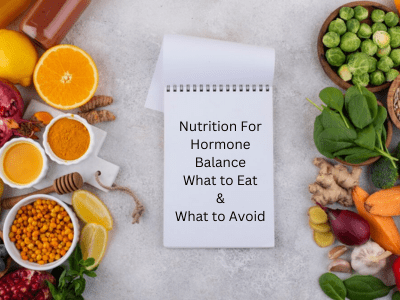Nutrition For Hormone Balance: What to Eat & What to Avoid

-
Posted by
 Prachi Shah
Prachi Shah
We blindly blame our hormones for slightest inconvenience in our mood or health. While this may not be entirely true but balancing our hormones plays a significant role when it comes to our well-being.
Let us start with basics and understand what hormones are-
Hormones are chemical messengers produced by various glands and tissues in the body that regulate essential processes such as growth, metabolism, reproduction, and mood. These molecules are secreted into the bloodstream and travel to target cells or organs, where they exert their effects by binding to specific receptors.
Hormones like Insulin, estrogen, progesterone, thyroid, cortisol etc. act as chemical messengers in the body. We need them to function in harmony to support mental and physical health.
What is Hormonal Imbalance?
Hormonal imbalance refers to disruptions or irregularities in the levels of hormones circulating in the bloodstream. Since they regulate so many processes in our body the imbalance will affect mood, energy levels, appetite, metabolism etc. This happens when the production, secretion, or action of hormones is disrupted, it can lead to a wide range of symptoms, health issues and can be a precursor to issues like acne, loss of appetite, blood sugar imbalance, weight gain, weight loss, insulin resistance.
Have a look at the signs and symptoms of hormonal imbalance-
- Irregular Menstrual Cycles: Changes in the length, frequency, or intensity of menstrual periods can indicate hormonal imbalances, such as polycystic ovary syndrome (PCOS), thyroid disorders, or perimenopause.
- Unexplained Weight Gain or Loss: Fluctuations in weight, especially without changes in diet or exercise, can be a sign of hormonal imbalance, particularly involving hormones like insulin, cortisol, or thyroid hormones.
- Fatigue and Low Energy: Persistent fatigue or low energy levels, despite adequate rest, can be associated with imbalances in cortisol (stress hormone), thyroid hormones, or other hormones involved in energy regulation.
- Mood Swings and Emotional Changes: Hormonal fluctuations can affect mood and emotional well-being, leading to symptoms such as irritability, anxiety, depression, or mood swings.
- Sleep Disturbances: Changes in sleep patterns, including difficulty falling asleep, staying asleep, or experiencing restful sleep, may be related to hormonal imbalances, particularly involving melatonin or cortisol.
- Skin Problems: Hormonal imbalances can contribute to skin issues such as acne, oily skin, dry skin, or changes in skin texture.
- Hair Loss or Thinning: Changes in hair growth patterns, including hair loss or thinning on the scalp, face, or body, may be associated with hormonal imbalances, particularly involving testosterone or thyroid hormones.
- Digestive Problems: Hormonal imbalances can affect digestion and gut health, leading to symptoms such as bloating, gas, constipation, diarrhoea, or abdominal discomfort.
- Memory and Concentration Issues: Hormonal fluctuations can affect cognitive function, leading to symptoms such as brain fog, difficulty concentrating, or memory problems.
- Joint Pain and Muscle Weakness: Hormonal imbalances, particularly involving cortisol or sex hormones, can contribute to joint pain, muscle weakness, or reduced exercise tolerance.
- Changes in Appetite and Food Cravings: Hormonal imbalances may affect appetite regulation, leading to changes in hunger levels, food cravings, or a tendency to overeat or undereat.
Eating foods for balanced diet is extremely necessary for harmony of hormones after all food is fuel. Right foods can heal your body from within. It can reduce inflammation; help reduce different signs and symptoms mentioned above and support body’s natural hormone production and secretion.
Here are some of the best foods to eat for hormone balance:
- Healthy fats are vital for hormone production and regulation. Incorporate sources of omega-3 fatty acids such as salmon, walnuts, flaxseeds, and chia seeds into your diet. Additionally, opt for monounsaturated fats found in avocados, olive oil, and nuts.
- Protein is essential for hormone synthesis and tissue repair. Choose lean sources of protein such as chicken, turkey, fish, tofu, tempeh, lentils, and beans to support hormone balance.
- Consume a variety of colourful fruits and vegetables to obtain a wide range of vitamins, minerals, and antioxidants. Berries, leafy greens, carrots, and bell peppers are excellent choices for promoting hormone balance.
- Opt for whole grains like quinoa, brown rice, oats, and barley instead of refined grains. Whole grains provide fibre and essential nutrients that support hormone balance and overall health.
- Fiber-rich foods such as legumes, fruits, vegetables, and whole grains help regulate blood sugar levels and promote healthy digestion, indirectly influencing hormone balance.
- Include probiotic-rich foods like yogurt, kefir, sauerkraut, and kimchi in your diet to support gut health. A healthy gut microbiome is linked to improved hormone regulation.
- Certain herbs and spices have anti-inflammatory properties and may support hormone balance. Turmeric, cinnamon, ginger, and garlic are examples of spices that can be incorporated into your meals.
What to avoid for hormone balance-
- Limit your intake of processed and refined foods, including sugary snacks, white bread, and packaged snacks. These foods can disrupt hormone balance and contribute to inflammation.
- Avoid foods high in trans fats such as fried foods, margarine, and commercially baked goods. Trans fats can interfere with hormone signalling and contribute to insulin resistance.
- Reduce your consumption of added sugars found in soda, candy, desserts, and sweetened beverages. High sugar intake can lead to insulin resistance and disrupt hormone balance.
- Limit your intake of caffeine and alcohol, as excessive consumption can disrupt sleep patterns and hormone production.
- While soy can be a healthy part of the diet, excessive consumption of soy-based products may affect hormone levels, particularly in individuals sensitive to phytoestrogens.
- Reduce your intake of processed meats like bacon, sausage, and deli meats, as they may contain additives and preservatives linked to hormonal imbalances.
- Avoid artificial sweeteners like aspartame and sucralose, as they may disrupt gut microbiota and hormone signalling.
We often neglect one major factor along with the diet that is physical activity. Yes, exercise has tremendous effect on our hormone balance. Several hormones are affected by exercise, and regular physical activity can help maintain their balance. Here’s how exercise influences hormone levels:
- Endorphins: Exercise triggers the release of endorphins, which are neurotransmitters that act as natural painkillers and mood elevators. Endorphins help reduce stress and improve mood, contributing to a sense of well-being.
- Cortisol: Cortisol is often referred to as the “stress hormone” because its levels increase in response to stress. While acute bouts of exercise can temporarily elevate cortisol levels, regular moderate-intensity exercise has been shown to help regulate cortisol levels, reducing chronic stress and its negative effects on the body
- Insulin: Exercise helps regulate blood sugar levels and improves insulin sensitivity. Insulin is a hormone that regulates glucose metabolism, and regular physical activity can help prevent insulin resistance, a precursor to type 2 diabetes.
- Leptin and Ghrelin: These hormones play a role in appetite regulation and metabolism. Exercise can help balance leptin and ghrelin levels, promoting healthy eating patterns and weight management.
- Thyroid: Exercise can influence thyroid hormone levels, which regulate metabolism. Regular physical activity helps optimize thyroid function, which in turn supports energy levels and weight management
No matter how perfect your food and workouts are, it is always incomplete without a good sleep. Rest is so important for hormonal health. Hormones mentioned above like ghrelin, leptin, cortisol, and insulin are also linked to sleep. Poor sleep is associated with increase in cortisol levels and, impairing insulin sensitivity. Good quality of sleep also balances hunger hormones a basic example would be your mid night cravings- You usually feel hungry when you are awake at odd hours binging your favourite TV show. Short sleep increases ghrelin- hunger hormone.
Maintaining hormone balance is essential for overall health and well-being. By incorporating nutrient-rich foods you can support optimal hormone function. Even with the factors out of your control you can still take several things into account to manage that. Remember, making small, sustainable changes to your diet can have a significant impact on hormone balance and overall health. If you have specific concerns about hormone levels or imbalances, it is best to consult with a healthcare professional for personalized advice.
